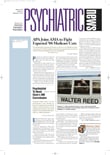When U.S. soldiers are severely injured while stationed in Iraq or Afghanistan, once they are stabilized overseas, they are sent for surgery and rehabilitation to Walter Reed Army Medical Center in Washington, D.C. The teaching hospital has earned a reputation in the military for providing high-quality patient care.
Members of the psychiatric consultation-liaison (C-L) service visit the soldiers daily to establish a therapeutic relationship.
“We want the soldiers to see us as an ally that they can turn to for help,” Harold Wain, Ph.D., chief of the psychiatric C-L service told Psychiatric News. “We thank the soldiers for serving their country and introduce ourselves as members of the trauma-treatment team. We reassure them that we ask all injured soldiers the same questions.”
The average length of stay at Walter Reed is two weeks to one month for most injured soldiers, said Wain. The main types of injuries are shrapnel wounds and severely damaged limbs that require amputation, he said.
Wain estimated that more than 200 U.S. soldiers had been treated at Walter Reed from March, when Operation Iraqi Freedom (OIF) began, to last month. That estimate includes about 40 soldiers from the conflict in Afghanistan.
Wain uses brief therapeutic interventions with the aim of preventing psychiatric stress disorders three or four months later. He honed this approach after the Pentagon was attacked in 2001. He and Maj. Geoffrey Grammer, M.C., an Army C-L psychiatrist, met with hospitalized civilian patients bedside and asked them about their experiences in a nonconfrontational and supportive manner.
“We also used an array of medications and brief interventions including hypnotic and cognitive reframing techniques,” said Wain.
“We focus on a person’s positive traits during brief psychotherapy to reinforce their resilience. For example, a soldier whose hand was blown off by a rocket-propelled grenade thought to pick [the hand] up and put in his gas mask for safekeeping so we could later reattach it. Another soldier who came under hostile fire remembered to put a tourniquet around his injured leg bone. Having a sense of humor also helps soldiers cope with their injuries,” said Wain.
Walter Reed is receiving between 30 and 40 OIF casualties a week. Many soldiers display symptoms of acute stress disorder including hypervigilance, startle responses, flashbacks, and sleep disturbances, said Wain. The C-L staff explain to injured soldiers that these are normal reactions to a traumatic event and should disappear soon with treatment.
“If the symptoms become more frequent or severe, we ask them to contact us, and we can provide a referral to a local psychiatrist. We also call soldiers 30 and 90 days postdischarge to get an update,” Grammer told Psychiatric News.
The C-L service has diagnosed a handful of soldiers since March with posttraumatic stress disorder (PTSD). “They had severe injuries and prolonged stays in the intensive care unit,” explained Grammer.
He uses hypnotic techniques including visual imagery to augment analgesics for soldiers experiencing uncomfortable physical sensations after their limbs are amputated. “One soldier who experienced ‘phantom limb’ said he felt his toes were crossed and he couldn’t uncross them. I taught him a hypnotic technique that distracted him from that sensation,” said Grammer.
Amputees typically have to adjust their daily routines and activities once they return to their communities. “We help them anticipate what chores or athletic activities they can’t perform and suggest alternatives,” said Grammer.
He talks frequently with family members who are staying near the hospital. “I ask them about the soldier’s circumstances and how they’re coping. I give them permission to take care of themselves because they can be so focused on their loved one that they forget about their own needs. I also mention the family support group to them to help ensure they can support the soldier’s recovery,” said Grammer.
The C-L service also provides support groups for recovering soldiers, in addition to individual counseling. ▪
